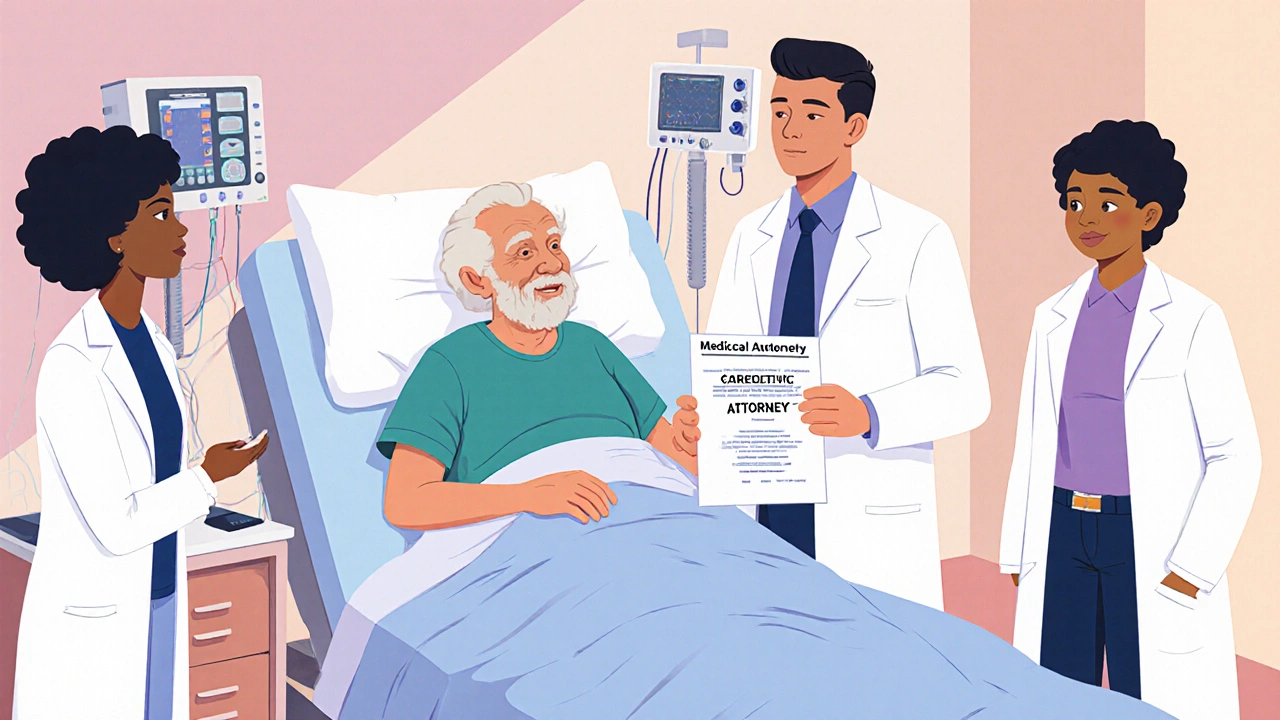Imagine you’re in the hospital after a stroke. You can’t speak. The doctors ask your family: Should we give her the blood thinner? What about the pain meds? Should we keep her on the ventilator? But no one knows what you’d want. That’s not just stressful-it’s dangerous. This is why having a medical power of attorney isn’t just paperwork. It’s protection.
What Exactly Is a Medical Power of Attorney?
A medical power of attorney (also called a healthcare proxy or durable power of attorney for health care) is a legal document that lets you name someone you trust to make medical decisions for you if you ever can’t speak for yourself. It doesn’t kick in while you’re alert and able to talk. It only activates when you’re unconscious, severely confused, or otherwise unable to communicate. This isn’t the same as a living will. A living will says, “I don’t want to be on a machine if I’m terminal.” But life doesn’t always fit neat boxes. What if you get pneumonia but aren’t dying? What if your pain meds stop working? What if you need a new antibiotic but can’t say you’re allergic? That’s where your agent comes in. They can read the situation, talk to doctors, and decide based on what they know about you.Why Medication Decisions Are the Most Common Point of Conflict
In intensive care units, the biggest arguments aren’t about life support. They’re about medications. A 2023 study in the Journal of Pain and Symptom Management found that patients with a named healthcare agent had 32% fewer conflicts over medication choices during hospital stays. Why? Because decisions like these are messy:- Should we give him opioids for pain, even if he’s confused?
- Do we stop his blood pressure meds if his numbers drop too low?
- Can we give her antibiotics if she’s allergic to one type but not another?
- Do we use an injection if she won’t swallow pills anymore?
What Your Agent Can and Can’t Do
Your agent has broad authority-but not unlimited power. In most states, they can:- Decide which medications to give, stop, or change
- Choose between oral pills, injections, or IV delivery
- Consent to or refuse surgery, chemotherapy, dialysis, or ventilators
- Access your medical records
- Decide where you’re treated-hospital, nursing home, or home care
- They can’t override state laws (e.g., some states ban assisted suicide)
- They can’t act against your clearly stated wishes
- In some states, they need a doctor’s certification before withdrawing life support
- Pyschiatric medication decisions can be restricted in certain states like Indiana

How to Choose the Right Person
Your spouse? Your oldest child? Your best friend? Don’t pick based on family hierarchy. Pick based on reliability and emotional stability. Ask yourself:- Do they handle stress well under pressure?
- Will they stand up to doctors if they think you’re being over-treated?
- Do they understand your views on pain, independence, or quality of life?
- Are they willing to say “no” to family members who push for more intervention?
Don’t Rely on the Form Alone
You can download a free medical power of attorney form from your state’s health department. Fill it out. Get it notarized. Done, right? Wrong. A 2022 survey by The Conversation Project found that 41% of agents felt unsure about what the person they were representing would want-especially when it came to medication. Why? Because the form just says, “I appoint John Doe as my agent.” It doesn’t say why. The most effective advance directives include:- A written note: “I don’t want morphine if it makes me confused. I’d rather be alert and in pain than sedated and unaware.”
- A list of specific medications you’ve had bad reactions to
- Names of doctors you trust
- Where to find your medical records (e.g., “My EHR is on MyChart under Tony Newman”)
What About POLST or MOLST Forms?
If you have a serious illness-like advanced cancer, heart failure, or late-stage dementia-a POLST (Physician Orders for Life-Sustaining Treatment) form might be more useful than a standard advance directive. POLST is a medical order, signed by your doctor, that tells EMS, hospitals, and nursing homes exactly what to do:- “Do Not Resuscitate”
- “Only comfort measures”
- “Give antibiotics if I get pneumonia”
- “Tube feeding not preferred”

How to Get Started (Step by Step)
You don’t need a lawyer. But you do need time and honesty.- Choose your agent. Talk to them first. Make sure they say yes.
- Have the conversation. Discuss medications, pain, hospital stays, and what “quality of life” means to you.
- Download your state’s form. Search “[Your State] medical power of attorney form.” Most are free.
- Fill it out. Sign it. Get two witnesses (not your agent or someone who inherits from you). Some states require notarization.
- Give copies to: your agent, your doctor, your main family member, and your hospital’s medical records department.
- Review it yearly. If you get a new diagnosis, change medications, or your relationship with your agent shifts-update it.
What Happens If You Don’t Have One?
If you don’t name someone, the court may appoint a guardian. That’s expensive. It’s slow. And the person they pick? Might not know you at all. Worse-your family might fight. One child wants to keep you alive. Another wants to let you go. Doctors get stuck in the middle. Medications get delayed. Treatments get given-or withheld-based on guesswork. A 2023 case in Indiana involved an agent who refused blood thinners because they thought the patient “never wanted to be on meds.” The patient later had a stroke. The family sued. The agent didn’t know the patient had taken blood thinners for 15 years to prevent clots. That’s not negligence. That’s silence.Final Thought: It’s Not About Death. It’s About Control.
This isn’t about giving up. It’s about keeping your voice alive-even when you can’t speak. You’ve spent your life making choices: where to live, who to marry, how to raise your kids. Why should your medical care be any different? A medical power of attorney doesn’t take away your autonomy. It extends it. It says: Even if I’m silent, my wishes still matter. Start today. Talk to someone. Fill out a form. Don’t wait for the crisis. Because when it comes, you won’t have time to think.Can I change my medical power of attorney after I’ve signed it?
Yes. You can revoke or change your medical power of attorney at any time as long as you’re mentally capable. Just destroy the old form, fill out a new one, and tell everyone who had a copy. Your new agent takes over immediately once the new document is signed and witnessed.
What if my agent can’t make a decision?
If your agent is unsure, they’re legally required to make the decision based on what they believe you would want. If they truly can’t decide, they can ask the doctor for guidance or consult with family-but they can’t refuse to act. If they fail to act, a court may step in and appoint someone else.
Do I need a lawyer to create a medical power of attorney?
No. All 50 states provide free, state-approved forms you can complete on your own. You just need two witnesses (who aren’t your agent or a beneficiary) or a notary. A lawyer is only necessary if your situation is complex-like if you have multiple children who might contest the decision, or if you have assets you want to protect alongside your healthcare wishes.
Can my agent make decisions about psychiatric medications?
In most states, yes. But some states, like Indiana, require extra steps for psychiatric decisions. You may need a separate psychiatric advance directive, signed by your doctor, to give your agent full authority over mental health treatments. Check your state’s health department website for specifics.
What if my family disagrees with my agent’s decision?
Legally, your agent has the final say-if they’re acting in line with your wishes. Family members can’t override them. But if they believe the agent is acting against your values, they can petition the court to remove them. That’s why clear communication and written notes are so important-they protect your agent from accusations.


Denny Sucipto
November 18, 2025 AT 08:19My grandma had a stroke last year. We had no idea what she’d want. Thank god she’d written down she didn’t want no tubes or needles if she couldn’t laugh anymore. We cried, but we didn’t fight. That paper? It saved us.
Christine Eslinger
November 18, 2025 AT 10:23This is one of those topics people avoid until it’s too late. I used to think, ‘I’m young, I’ve got time.’ Then my cousin’s mom ended up in ICU with no directive, and the family tore itself apart over whether to give her insulin or not. She was diabetic. They didn’t know. That’s not just tragic-it’s avoidable. Do it now. Not tomorrow. Today.
Holly Powell
November 18, 2025 AT 13:46Let’s be real-the entire advance directive industry is a $12 billion scam built on guilt and fear-mongering. Most people don’t need a ‘medical power of attorney.’ They need a family that talks. The legal jargon? Just a way for lawyers to profit off your mortality anxiety. Also, POLST forms are often misused as death warrants by overworked ER docs who don’t want to deal with ‘complicated cases.’
Kristina Williams
November 19, 2025 AT 05:10Did you know the government is secretly using these forms to track elderly patients and push euthanasia? It’s in the fine print of the 2021 CDC guidelines. They call it ‘resource allocation optimization.’ I saw a whistleblower video on Telegram. They’re already tagging people who don’t have POAs as ‘low priority.’ You think this is about autonomy? Nah. It’s about control. And they’re coming for your meds next.
Shaun Barratt
November 21, 2025 AT 00:12While I appreciate the intent behind this post, the terminology used in the section regarding POLST forms is misleading. In jurisdictions such as California and Oregon, POLST is not merely a supplement-it is a binding medical order under state law, enforceable by EMS personnel and hospital systems alike. The distinction between an advance directive and a POLST is not semantic but juridical. Failure to recognize this may result in unintended clinical consequences.
Louie Amour
November 21, 2025 AT 23:13Oh wow, another ‘just fill out a form’ pep talk from someone who’s never sat in an ICU waiting room while their mom’s heart is failing and the nurses keep asking, ‘Who’s the decision-maker?’ You think a piece of paper stops family drama? My sister and I had to hire a mediator because she wanted to ‘let go’ and I wanted to ‘fight.’ The form didn’t matter. What mattered was that we never talked about it until it was too late. And now? She won’t speak to me. Thanks, advice column.
Gabriella Jayne Bosticco
November 23, 2025 AT 02:04I’m from the UK and we don’t have POAs exactly like this-but we have ‘advance decisions to refuse treatment.’ Same idea, different name. What really stuck with me? The video part. My mum recorded one last year. She said, ‘If I’m staring at the ceiling and not talking to you, turn off the beeping.’ We laughed. Then we cried. Now I keep it on my phone. It’s the most important thing I’ve ever saved.
Shilpi Tiwari
November 23, 2025 AT 21:08As an Indian clinician working in palliative care, I can confirm that medication-related conflicts are the #1 source of ethical distress in ICUs here too. The real gap isn’t documentation-it’s cultural. Families often defer to doctors out of deference or fear, and the agent’s role becomes performative. We’ve started using ‘values clarification cards’-simple visual prompts asking, ‘Would you rather be alert and in pain, or asleep and comfortable?’-and it cuts decision time by 60%. Also, psychiatric directives are legally ambiguous in 18 Indian states. You need a separate form under the Mental Healthcare Act, 2017. Don’t assume your POA covers it.
Iska Ede
November 23, 2025 AT 23:31So you’re telling me I need to plan my death like I plan my grocery list? ‘Add: 1 POA, 2 emotional conversations, 3 copies for the hospital, 1 extra for the cat-sitter.’ 🤡 I mean… fine. I’ll do it. But only because I don’t want my brother to decide if I get morphine or a jazz playlist. 🎵
Heidi R
November 25, 2025 AT 18:13My sister is my agent. She’s also my ex-best friend. I didn’t tell her I changed it. She doesn’t know. I don’t trust her. And I don’t want her to know what I really want. I just want to make sure they don’t give me that one drug-the one that makes me feel like I’m drowning. That’s it. That’s all I need.
Hal Nicholas
November 27, 2025 AT 10:51Look, I’m not saying you’re wrong. But you’re not right either. People don’t need forms. They need to stop pretending they’re immortal. I watched my dad die in a hospital because his ‘agent’ was too scared to say no. He had a form. Signed. Notarized. And still, they kept feeding him. He was 91. He wanted to go home. No machines. No painkillers that made him forget his own name. They gave him both anyway. Because no one had the guts to read the damn paper.
Emanuel Jalba
November 28, 2025 AT 02:14My mom did this last year. I cried. Then I posted it on Instagram. Got 2.3k likes. 🙏 #DeathIsNotTaboo #POAForLife #MyVoiceWillLiveOn 💔🩺 #DontWaitUntilItsTooLate
Brenda Kuter
November 28, 2025 AT 23:56They’re watching. I know you think this is just paperwork-but what if the hospital system uses your POA to flag you as ‘low-value’ and denies you care? I read a leaked memo from UnitedHealthcare. They’re already using AI to predict who’s ‘likely to die soon’ based on whether they have a POA. If you don’t have one, you’re automatically flagged for ‘cost containment.’ This isn’t protection. It’s a death algorithm. And they’re coming for your meds next.